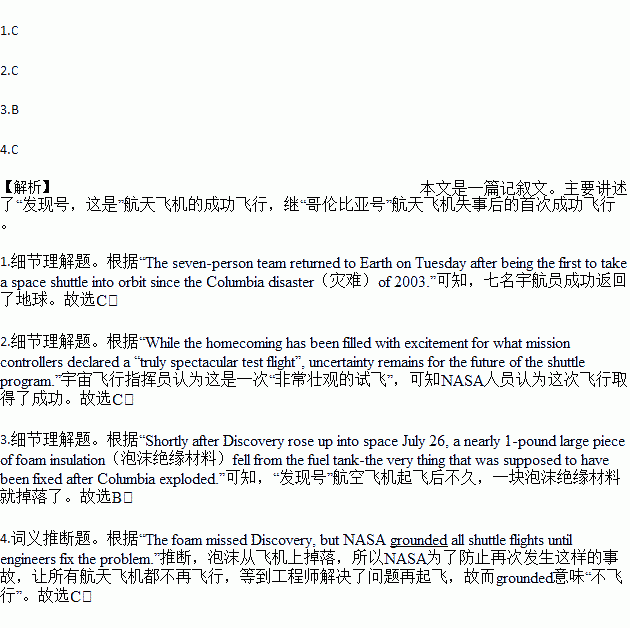题目内容
Discovery’s astronauts arrived to an exciting celebration Wednesday as nearly 700 people crowded an airplane storage place, waving flags and holding signs that read: “Welcome Home, Astronauts!”
The seven-person team returned to Earth on Tuesday after being the first to take a space shuttle into orbit since the Columbia disaster(灾难)of 2003.
“In the last two and a half years, we have been through the very worst that manned space flight can bring us, and over the past two weeks we have seen the very best,” NASA Administrator Michael Griffin told the astronauts and their families and fans Wednesday.
The crowd waved American flags for the U.S. astronauts and Japanese flags for crew member Soichi Noguchi, one of the spacewalkers.
“As a rookie(新手)astronaut, I could not ask for more,” Noguchi said, “We had three spacewalks, two extra days in space and one great team.”
While the homecoming has been filled with excitement for what mission controllers declared a “truly spectacular test flight”, uncertainty remains for the future of the shuttle program.
Shortly after Discovery rose up into space July 26, a nearly 1-pound large piece of foam insulation(泡沫绝缘材料)fell from the fuel tank-the very thing that was supposed to have been fixed after Columbia exploded. The foam missed Discovery, but NASA grounded all shuttle flights until engineers fix the problem.
NASA ground crews examined Discovery after its return from orbit and found it in good condition, an official said Wednesday at NASA‟s Dryden Flight Research Center at Edwards Air Force Base in California.
Technicians counted 101 dings and divots, including 20 that were larger than 1 inch. Schaaf Dean, landing support group chief, said the numbers were similar to the results of other shuttle, post-landing examinations.
A beginning examination of the shuttle’s thermal(热的)blanket showed it remained undamaged during re-en-try into the Earth’s air.(Agencies)
1.The seven astronauts .
A. are the first to take a space shuttle into orbit
B. took the Columbia into space
C. returned to earth safely
D. are Americans
2.According to the text, the NASA officials think .
A. the flight of Discovery is a failure
B. manned space flight has been through the best in the past
C. the flight of Discovery is a success
D. the astronauts are national heroes
3.When the Discovery took off, .
A. the fuel tank burned B. a piece of foam insulation fell
C. the safety belt is not fixed D. it knocked into the Columbia
4.The underlined word “grounded” means .
A. (of a boat) hit the bottom of a sea and be unable to move
B. to cause a boat to hit the bottom of a sea or lake
C. to prevent a plane or person from flying
D. to be based on something
 数学奥赛暑假天天练南京大学出版社系列答案
数学奥赛暑假天天练南京大学出版社系列答案
